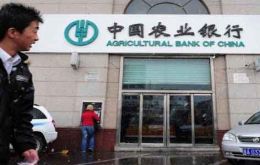MercoPress. South Atlantic News Agency
International
-
Wednesday, August 18th 2010 - 02:58 UTC
Whiskey’s noblesse: super bio-fuel (butanol) from distilleries by products

Topping up at the petrol pump is about to take an intriguing twist as cars are set to be fuelled with a new super bio-fuel, made from whisky by-products. Edinburgh Napier University has filed a patent for the new bio-fuel, which can be used in ordinary cars, without any special adaptations needed.
-
Wednesday, August 18th 2010 - 00:38 UTC
Environmentally friendly mini-cows latest trend in US farms

They have become the latest trend in United States farms and an estimated 20.000 miniature cattle, weighing less than 300 kilos, are believed to be successfully breeding and could be indicating the future for environmentally-friendly beef.
-
Tuesday, August 17th 2010 - 09:20 UTC
Chinese biggest state-owned bank raises 22 billion in initial public offering

Agricultural Bank of China raised a record 22.1 billion USD in its initial public offering (IPO) in July despite a lukewarm response when the shares first went on sale. The IPO is the last by China's four biggest state-owned banks.
-
Tuesday, August 17th 2010 - 09:04 UTC
Remarkable photos of the August 1968 Soviet-led invasion of Prague

The Argentine foundation for the endowment of art and culture OSDE has opened an exhibition in Buenos Aires which recalls the Soviet invasion of Prague in 1968. The remarkable photographs were taken during one week in August of 1968, which capture the Soviet-led invasion of Prague.
-
Tuesday, August 17th 2010 - 08:56 UTC
“Argentina/UK relation must go beyond the Falklands/Malvinas conflict”

The Argentina/UK relation must go beyond the Falklands/Malvinas conflict, said British ambassador Shan Morgan during a recent visit to Salta, one of Argentina’s most northern provinces famous for its landscape and agro-industry potential. She also praised Argentine labour and talent and was hopeful a trade agreement could soon be reached with the European Union.
-
Monday, August 16th 2010 - 04:20 UTC
Strong rebound of the German economy: GDP 3% growth in 2010

German gross domestic product (GDP) could grow by as much as 3% in 2010, as positive quarterly figures have stoked optimism in Europe's largest economy, Die Welt newspaper reported on Sunday, citing Economy Ministry officials.
-
Monday, August 16th 2010 - 04:12 UTC
Gibraltar/La Linea dispute triggers ample coverage in UK press

Ashley Fox Tory MEP for South West of England & Gibraltar has written to the UK press about the current developments in La Linea, reports the Gibraltar Chronicle.
-
Monday, August 16th 2010 - 04:03 UTC
Japan’s economy slows down considerably in second quarter

Japan’s economy expanded at the slowest pace in three quarters. GDP rose an annualized 0.4% in the three months ended June 30 from a revised 4.4% expansion in the first quarter, the Cabinet Office said in Tokyo.
-
Monday, August 16th 2010 - 03:52 UTC
China extends influence to Sri Lanka, finances and builds new port

Sri Lanka has unveiled a new seaport, the showpiece among a series of big new infrastructure projects on the island. The port in southern Hambantota was built with Chinese assistance as part of a 6 billion US dollars drive to rebuild infrastructure after the war.
-
Saturday, August 14th 2010 - 08:48 UTC
Coal power opposition goes global

Almost 10,000 people from 100 countries have objected to plans for a new coal-fired power station at Hunterston in Ayrshire, Scotland, it was revealed yesterday (Friday 13 August) by WWF.
